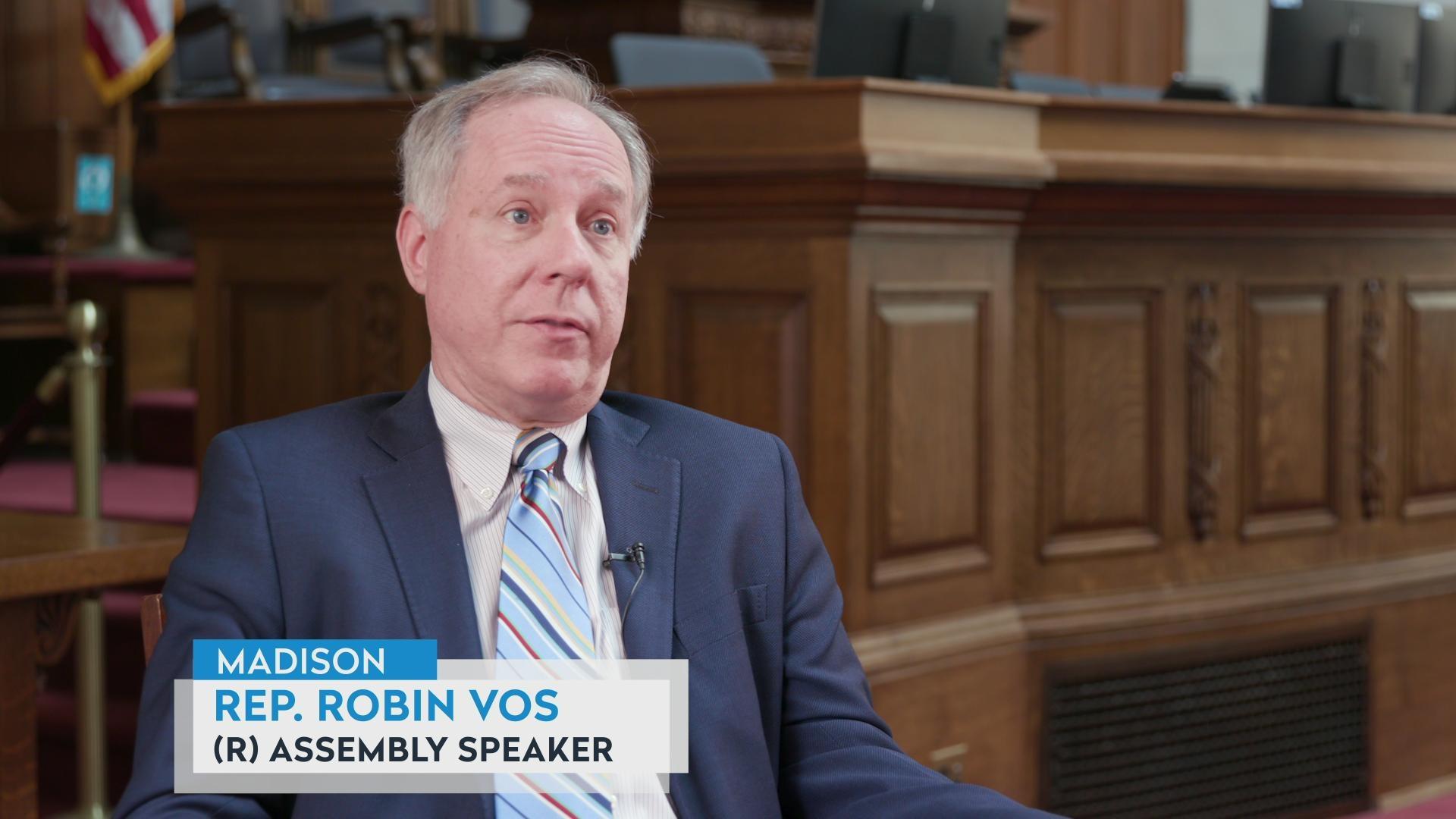Frederica Freyberg:
Now to the 2020 race for president and Wisconsin’s role. In tonight’s inside look, we got a chances to catch up with FiveThirtyEight Senior Political Writer Clare Malone. Malone served as the Fall 2019 Public Affairs Journalist in Residence at UW-Madison. She talks about electability and identity politics. In our discussion, we started by asking about those terms and how they factor in the race for president here in Wisconsin.
Clare Malone:
When we’re talking about identity politics, we’re talking about how white people and black people and women and men see the same issue in very different ways. And I think identity politics can sometimes get thrown around as a bad term. But I do actually — or a term that’s meant to be derisive. But I do think it’s an actually important thing for all of us to understand about politics because we are often reacting to issues emotionally. There’s nothing wrong with that because that’s the way human beings interact with the world. So that’s what they are.
Frederica Freyberg:
How does identity politics factor into Wisconsin with its Obama/Trump voters?
Clare Malone:
Wisconsin is an incredibly important state. And in part because it has those traditionally Democratic voters who, as you say, voted for Obama and switched over to Trump. The interesting thing about Wisconsin is that we’re talking about the identity politics of white people. So those Obama/Trump voters tended to be white people without a college education, who had voted for Democrats for a really long time and something kind of changed in their party affiliation during the Obama years. During a time when, yes, we had a black president. I think about issues about race were talked about a little more frankly and a little more out in the open. And I do think that some people, you’ll hear people talk about PC culture, right? I think in some ways that’s a reference to the more open conversation people were having about race. And some of those voters saw that as, you know, you could say — you can call it racism or you can say it’s a reaction to what they say is a bad focus for the Democratic Party. The Democratic Party should only be focused on economic issues, right, not issues of race. Those people ended up voting for Donald Trump. Now, voting for Trump, there’s a lot of reasons people voted for Donald Trump, but we do see in the numbers that there was a really big shift during the Obama era of white non-college educated people, who used to be Democrats switching over to the Republican side of things. And you can’t help but think that the first black president had something to do with that.
Frederica Freyberg:
How will those voters be won over in this next election?
Clare Malone:
Well, I think a lot of people on Joe Biden’s team would tell you that, first of all Joe Biden is the leading candidate with black voters and they would say that Joe Biden for those Obama/Trump voters who keep on asking or saying we want the Democratic Party of old. We want to focus on economic issues. They might find Joe Biden to be, A) maybe more of a moderate person in his ideology but B) he also kind of looks how we think presidents have typically looked, right? He’s an older white man. And I think that there is something comforting in Biden’s identity to maybe those Obama/Trump voters. Those people who were generalizing as white, non-college educated voters in places like Wisconsin, Ohio, Pennsylvania and Michigan. So the other candidates, I think you’ll see people make attacks on Warren or Harris or even Sanders for being too liberal, for one thing, and also being, you know, in the case of the women, reminders of Hillary Clinton and the 2016 campaign.
Frederica Freyberg:
So is all of that around electability?
Clare Malone:
Yes. I mean, I think that there is — electability is such a freighted term these days. What I think, you know, what electability has come to mean in this current election cycle is, it’s become a shorthand for who can win those Obama/Trump voters back in the electorally key states of Wisconsin, for instance. And I think it is an undeniable fact that those Wisconsin swing voters of a certain persuasion might be more inclined to like Joe Biden and his identity and to like Joe Biden and his more moderate policies. Because once you get into the zone of talking about say Bernie Sanders’ and Elizabeth Warren’s health care plans, which they’re basically running on. You know even a lot of Democrats don’t love the idea of Medicare for all and they might be more comfortable with Biden’s plan, which is Medicare for some or a public option. So I think you start to get into really interesting intersecting issues of identity politics but also just the Democratic Party is in an ideological flux. And some really people are running and then you’ve got someone like Joe Biden.
Frederica Freyberg:
In terms of the “electability” word, is it kind of fair or right to decide who to support based on electability?
Clare Malone:
Well, I think that a lot of Democratic voters are doing it. This is a first — and to a certain extent, yes. It’s a rational reaction to the realities of the world, right? I think Democratic voters, this is the first time in quite some time that Democratic voters have told pollsters I would vote for someone who I think has the best chance to win, even if I don’t really agree with him the most out of any of the candidates in the field. And I think that that’s a strategic way of thinking about the election, right? It’s a strategic way of understanding that we are a country that elects its presidents not by popular vote, but by Electoral College vote. And inevitably, certain states have more power in that process. Certain states like, again, Wisconsin, Ohio, Pennsylvania, that have specific demograph population — demographics in their population, right? They tend to be whiter, particularly Wisconsin, for example. So people are kind of bowing to the realities of, “Okay, this is who’s deciding the election. Maybe we should choose a candidate that will appeal to them.” Then I think you have the other side of the electability thing, which is should we be perpetuating these kind of — I think most people would agree that racism and sexism are bad things in the world. And so the idea of should we be perpetuating those standards that certain candidates are — only certain candidates should be the people who are our candidate because they are more appealing to racist or sexist people. That’s a really hard conversation to have. And I think Democratic voters do kind of find themselves in a moral bind, which is one of the reasons why I think you see people who don’t like Joe Biden who are Democratic voters really don’t like Joe Biden in part because what they think he represents about electability. In part because they think perhaps he’s a concession to Trump voters, who they as Democratic voters, more liberal Democratic voters, might see as having enabled a racist or sexist president.
Frederica Freyberg:
We need to leave it there. Clare Malone, thanks very much.
Clare Malone:
Thanks for having me.
Frederica Freyberg:
Clare Malone has a story up on FiveThiryEight.com titled “The Front-Runner?” about Joe Biden and his strength with black voters.
Search Episodes
News Stories from PBS Wisconsin

Donate to sign up. Activate and sign in to Passport. It's that easy to help PBS Wisconsin serve your community through media that educates, inspires, and entertains.
Make your membership gift today
Only for new users: Activate Passport using your code or email address
Already a member?
Look up my account
Need some help? Go to FAQ or visit PBS Passport Help
Need help accessing PBS Wisconsin anywhere?

Online Access | Platform & Device Access | Cable or Satellite Access | Over-The-Air Access
Visit Access Guide
Need help accessing PBS Wisconsin anywhere?

Visit Our
Live TV Access Guide
Online AccessPlatform & Device Access
Cable or Satellite Access
Over-The-Air Access
Visit Access Guide
 Passport
Passport


















Follow Us